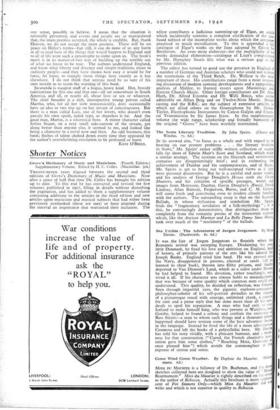IN its avowed aim, " to focus as a whole
and with regard to its bearing on our present problems . . . the literary tradition in Scots," Mr. Speirs' rather stiffly written collection of studies falls far short of Edwin Muir's Scott and Scotland, which made a similar attempt. The sections on the fifteenth and seventeenth centuries are disappointingly brief ; and in estimating the achievement of Dunbar and his contemporaries, and of Burns, Mr. Speirs is apt to bring out well-accepted views as if they were personal discoveries. But he is a careful and acute reader, and his analysis of George Douglas's House with the Green Shutters, and his criticism of specific passages, words and images from Henryson, Dunbar, Gavin Douglas's lEneid, David Lindsay, Allan Ramsay, Fergusson, Burns, and C. M. Grieve, will come fresh and convincing even to readers closely familiar with the authors. The outstanding essay is that on the Scottish Ballads, in whose stylisation and symbolism Mr. Speirs finds the " fragmentary revelation of a folk-mythology " ; it o this, he convincingly demonstrates, that distinguishes them so completely from the romantic poems of the nineteenth century which, like the Ancient Mariner and La Belle Dame Sans Men; took over much of the " machinery " of the ballads.


























 Previous page
Previous page